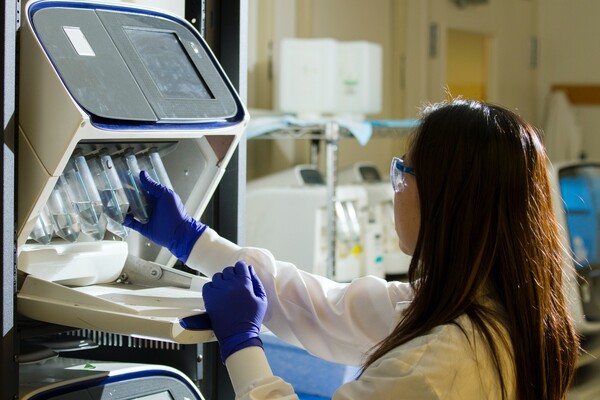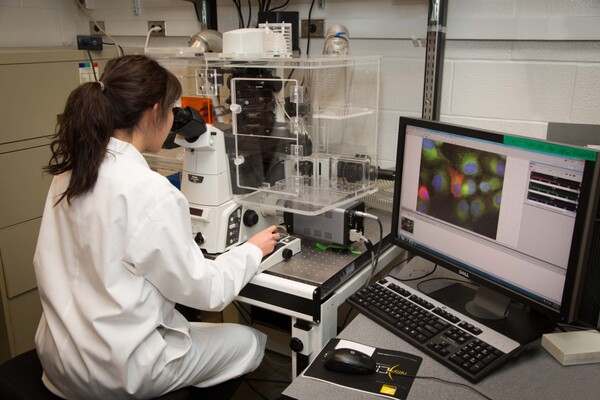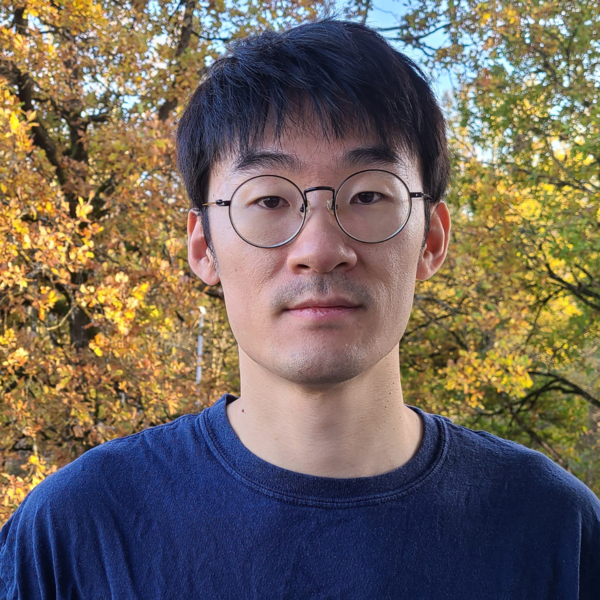
Breadcrumbs
- Home
- Future Students
- Graduate Education
- Explore our Graduate Programs
- Thesis-Based Programs
- Medical Biophysics
Medical Biophysics
MSc & PhD
The Department of Medical Biophysics offers interdisciplinary research-focused graduate studies at both the Masters (MSc) and Doctoral (PhD) level. Focusing on basic and translational research, we offer students a diverse and highly integrated modular curriculum which reflects the increasing specialization in biomedical science.
Our rotation system is a key feature of our training that allows newly admitted students to experience 3 different labs before deciding on a "best fit" thesis lab. This allows students to explore the breadth and depth of the research conducted and find the ideal learning environment to succeed.
Cancer research remains our principal focus, followed by cardiovascular disease and neuroscience. We bring together researchers from diverse scientific areas, who work on multidisciplinary projects.
In our labs, you will find faculty and students with backgrounds in molecular and cell biology, physiology, biochemistry, chemistry, physics, mathematics, engineering, computer science and beyond. The department stresses an interdisciplinary approach to medical research, which is the hallmark of medical biophysics.
Our Programs

In addition to completing a thesis, students take 2.5 FCE*:
- MBP 1015Y (Biomedical Seminar, 1.0 FCE),
- MBP 1200H (Scientific Exposition and Ethics, 0.25 FCE)
- MBP 1201H (Biostatistics, 0.25 FCE)
- Biology-related course (0.25 FCE) and
- Elective courses (0.75 FCE).
Students successfully finish this program in 2 years.

In addition to conducting independent and original research that will form their
thesis, students complete 3.5 FCE:
- MBP 1015Y (Biomedical Seminar, 1.0 FCE);
- MBP 1200H (Scientific Exposition and Ethics, 0.25 FCE);**
- MBP 1201H (Biostatistics, 0.25 FCE)
- Biology-related course (0.25 FCE) and
- Elective courses (1.75 FCEs).
Typically, students successfully complete this program in 6 years.
Alumni Profile

Hui Guo, PhD
In the PhD program, I received extensive training in designing, conducting and communicating my research. These skills allowed me to pursue further training as a postdoctoral fellow at the Max Planck Institute of Biochemistry in Germany.
It was during my time as a PhD student that I developed an interest in research and I decided to pursue a career as an independent researcher. The skills and experiences I gained during my PhD will remain useful in my career down the road.
For new graduate students, the most important thing in graduate school is to find a lab with a supportive supervisor and lab mates. Whatever your eventual goal might be, a solid MSc or PhD can be a plus. Try to be patient and enjoy the process!
Potential Career Paths
In 2022, the School of Graduate Studies (SGS) tracked the career outcomes of 5,128 PhD students who graduated from the University of Toronto between 2016 to 2021. The data below is from 146 medical biophysics PhD graduates.
Positions
Some examples of positions our medical biophysics graduates held included:
- Biotechnology and pharmaceutical jobs
- Hospital-based jobs
- Postdoctoral fellowships
- Tenure-stream faculty
Employers
Some examples of employers for whom our medical biophysics graduates worked included:
- The University of Toronto
- Harvard University
- BenchSci
The chart below shows a percentage breakdown of the various sectors in which our medical biophysics PhD graduates worked at the time the survey occurred.
Main Employment Sectors of Medical Biophysics PhD Graduates
Chart data
| Post-Secondary Education | Private Sector | Public Sector | Charitable Sector | Individual Sector | Info Not Public/Other |
|---|---|---|---|---|---|
| 32.9 | 43.2 | 17.1 | 2.7 | 1.4 | 2.7 |
By the Numbers
Department of Medical Biophysics
*Full course equivalent. A typical 0.5 FCE is over one term (13 weeks), meeting 1-2 times per week. A typical 1.0 FCE is over two terms (26 weeks), meeting 1-2 times per week.